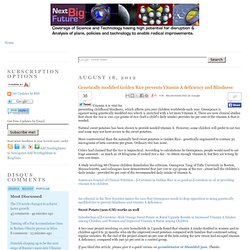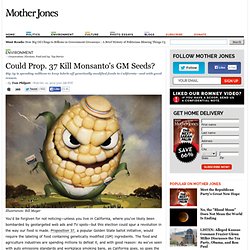

Genetically modified Golden Rice prevents Vitamin A deficiency and Blindness. Vitamin A is vital for preventing childhood blindness, which affects 500,000 children worldwide each year.

Greenpeace is against using genetically modified rice which is enriched with a lot more Vitamin A. There are now clinical studies that show the rice is 100-150 grams of rice (half a child's daily intake) provides 60 per cent of the vitamin A that is needed. Natural sweet potatoes has been shown to provide needed vitamin A. However, some children will prefer to eat rice and some may not have access to the sweet potatoes. More controversial than the naturally bred sweet potatoes is Golden Rice - genetically engineered to contain 30 micrograms of beta-carotene per gram. Critics had claimed that the rice is impractical. A study involving 68 Chinese children demolishes the criticism. American Journal of Clinical Nutrition - β-Carotene in Golden Rice is as good as β-carotene in oil at providing vitamin A to children Sweet Potato (non-GM) works as well. How will the world react if India says no to GE food? Genetically engineered (GE) food is a hot button topic in India.

What happens here often sends ripples throughout the GE debate worldwide, but what happened last week is surely a major milestone. The Parliamentary Standing Committee on Agriculture, made up of members of parliament (MPs) from across party lines, tabled its latest report on GE food and GE crops following intense consultation with farmers, environmental groups, scientists and consumer groups. The committee undertook extensive consultation – perhaps the most comprehensive taken anywhere in the world. The committee took two and half years holding hearings across India and going through some 493 memoranda running to some 15,000 pages.
Could Prop. 37 Kill Monsanto's GM Seeds? Illustration: Bill Mayer You'd be forgiven for not noticing—unless you live in California, where you've likely been bombarded by geotargeted web ads and TV spots—but this election could spur a revolution in the way our food is made.

Proposition 37, a popular Golden State ballot initiative, would require the labeling of food containing genetically modified (GM) ingredients. The food and agriculture industries are spending millions to defeat it, and with good reason: As we've seen with auto emissions standards and workplace smoking bans, as California goes, so goes the nation.
At least 70 percent of processed food in the United States contains GM ingredients. Eighty-eight percent of corn and 93 percent of soybeans grown domestically are genetically modified. Californians appear ready to change that: An August poll found voters in the state favoring Prop. 37 by a margin of 3-to-1. Why the push to label GMOs? Some independent, peer-reviewed research has suggested trouble, however. Will Those Sneaky GMO Amendments Pass through an Underhanded Maneuver? Not if we stop them!

As we reported a few weeks ago, these amendments represent a sneaky, behind-closed-doors attempt to make GMO foods immune from court review. Now we have learned of an even sneakier, even more questionable legislative maneuver that might get them passed. The usual procedure for passing bills in Congress is for the House to pass its version and the Senate to pass its version. The two bills are reconciled by a joint conference committee, and then both chambers pass the final bill. The Senate has already passed its version of the Farm Bill, the comprehensive omnibus bill that is the primary agricultural and food policy tool of the federal government for the next four or five years.
But here’s the dirty trick: the conference committee won’t be reconciling the Senate bill with the House’s CR. There are a few pieces of legislation that are considered “must pass,” usually appropriations bills.
Costearth_20120501-1516a.